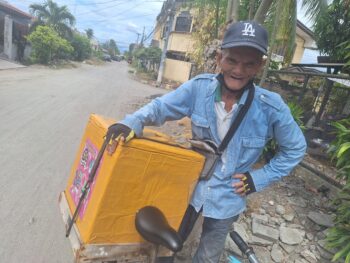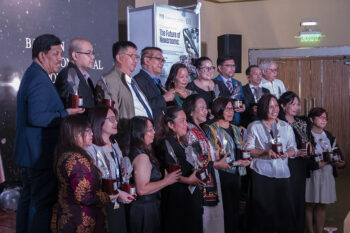MANILA (MindaNews/07 August) — Once a journalist, you will always have that itch to write. I have not stopped writing since joining government, yes, the bureaucracy, some four months ago, but not this kind of writing.
With the work load I am having now, I could have dealt with the itch to write my column or a news story for next time, until my mentor in journalism Carolyn Arguillas, editor and founder of Mindanao News and Information Service Cooperative Center (MindaNews) suggested I write about cooperatives.
There are a lot of things happening in the cooperative movement which is celebrating its centennial year. These things are from the current campaign for cooperatives to acquire, operate and manage the Agus Pulangi Hydro Electric Power Plants to the upcoming launching of the KoopTV Federation, the KooperatiBalita magazine, to converting electric cooperatives into genuine, consumer-owned cooperatives, so on and so forth.
The newly appointed chairman of the Cooperative Development Authority (CDA), Orlando R. Ravanera has been known for his environmental activism. He is an astute community development worker, writer, activist and more importantly dreamer.
He is one of the believers that the current socioeconomic system of the world is collapsing, and that the tipping point has been reached. But unlike doomsayers, he is optimistic there is hope – through cooperativism.
Be believes that the intrinsic design of the cooperative or its ‘DNA’ sort of, is the anti-thesis to the growth-at-all-cost, consumerist throw-away system that has resulted in gross social inequities. That cooperativism which is anchored on the principles of member ownership; value-based and sustainability can be a potent anti-thesis to the failed neo-liberal economic system.
I had asked many cooperative leaders and prime movers if indeed the cooperative movement in the country is ready for an ideological discourse of this sort. Some say the movement is indeed ready; others say it should be pursued, first by firming up the movement’s identity and taking stock of its contribution to nation-building.
Currently, there are 24,652 registered cooperatives nationwide. According to the CDA, cooperatives directly employed 520,758 Filipinos and indirectly employed 1,923,047 others as of December 2014. Their combined assets are over P600 billion.
Compared to the country’s macro economy, these may be small figures, but placed in the right context that these figures came from 13,000 million ordinary Filipinos who have decided to embrace cooperativism, this is a huge number. More importantly, it shames the culture of mendicancy which has seeped into the veins of our state systems.
Successful cooperatives have shown that it is possible for ordinary people to pool their resources and grow their enterprises big and play in the big league.
As an acknowledgment of the successes of cooperatives, Ravanera sees the potential for cooperatives to even grow bigger, not to accumulate more wealth, but to reach out to more people and contribute more to the betterment of society.
At first when the idea of cooperatives acquiring, operating and managing the Agus-Pulangi hydro complex emerged, many took it as a joke. But when around 5,000 people from all over Mindanao gathered in Cagayan de Oro last June 8 for the Mindanao Cooperative Energy Summit and launching of the 1Mindanao Energy Cooperative (1MIECOOP) federation, energy stakeholders started taking the bid seriously.
Mindanao-based cooperatives and large cooperatives from the Visayas and Luzon can raise the capital to acquire, manage and operate the privatization-bound power facilities which could supply up to 60 percent of Mindanao’s power needs.
Former Energy Secretary Jericho Petilla himself admitted that if the Agus-Pulangi goes to the cooperatives, the bigger winner will be the power consumers who will enjoy more of the island’s cheaper power rates. He even said that if the cooperatives can sustain their bid, eventually banks will knock on their doorsteps and offer financial services. “Eh ganun din naman mangyari if big private companies bid for the Agus-Pulangi, they will just raise the equity and loan from the banks the rest of the capital,” he said.
The only difference is that if ordinary people invest in their cooperative for the Agus-Pulangi venture, it is not like capitalists venturing to gain profit but rather democratizing the power sector and protecting their interests to have reliable and cheap electricity. It is literally putting power in the hands of the people.
1MIECOOP started as a dream. It may not have become a reality as yet, but it has proven to be a doable venture.
(The writer, a Mindanawon, works in the Office of Chairman of the Cooperative Development Authority. Comments can be sent to bency.ellorin@gmail.com)







